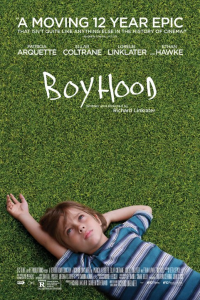
 So many things could have gone wrong while making Boyhood. And it’s possible that many things did go wrong, but you wouldn’t know it watching the film. Shot over 12 years, director
So many things could have gone wrong while making Boyhood. And it’s possible that many things did go wrong, but you wouldn’t know it watching the film. Shot over 12 years, director
Richard Linklater’s cinematic experiment has paid off handsomely by capturing a well-known Americana family dynamic and making the mundane passage of time seem downright profound. Laying on the grass outside his school, we meet Mason (Ellar Coltrane) at age five. His sandy brown hair is long over his ears—a youthful cut that is perfect for a five-year-old in all conditions. The ground around him is so very green and complements the blue sky and white clouds that
Mason appears to be pondering. His parents are divorced. His mother (Patricia Arquette) is struggling to find herself. His father (Ethan Hawke) is distant, works somewhere like Alaska. And Mason’s older sister, Samantha (Lorelei), is naive, but this isn’t her story even though she plays a key part in it.
Mason grows up right on screen, changing right before our eyes, and it’s not movie magic or digital or make-up trickery. Years pass with no title cards or even much explanation. But we get what’s going on early—the five-year-old becomes seven, then nine then, older. This is Mason’s life, and we get to live it with him over a running time of about two hours and 45 minutes. Mom will get married and divorced again. Dad will come and go. Life happens. And you won’t be able to stop watching.
The magic of Boyhood is that somehow the movie works and doesn’t become some kind of cliched sitcom or episodic soap opera. Shot on film as opposed to the emerging digital soup du jour, director Linklater (Before Midnight, Slacker, Dazed and Confused) is able to build a largely uniform visual scope that tightens as the characters age and the project likely became more of an actual feature than a fun experimental exercise.
An interesting side note that I read on the Internet was that having an actor under contract for 12 years may have presented legal problems. Also, actor Ethan Hawke is said to have agreed to finish directing the film if something happened to Richard Linklater (which, thankfully, nothing did happen). Safe to say, Boyhood is a unique passion project like no other.
And the commitment never seems to waiver. Everyone on screen is in tune as they go through various changes physically. Hawke gets noticeably older, stops chain-smoking, and becomes more mature in a way that deepens his character’s emotional connection with the viewer. We know that at the beginning of the film he’s playing Mason’s father, but by the end, he is beginning to realize exactly what that means by growing fully into the character. Fatherhood is the role of a lifetime.
Arquette, playing Mom, shows a lot of courage. We see weight changes from year to year, and she goes from a soft, young mother to a sophisticated college professor. It is remarkable. This is probably the best role she’s ever delivered, and it took 12 years to get it right.
But the young stars Ellar Coltrane and Lorelei Linklater change the most. They grow up! And their coming of age is captured in such a matter of fact manner that is accepted by the viewer without question. Coltrane goes from a cute child actor who performs his role well to a true actor who lives the performance.
I really liked that Lorelei is the director’s daughter in real life. Frequently, I work with my own daughter both on and off screen. She has been my television co-host and my assistant (recently working with me as I shot interviews while riding on MARTA through Atlanta). When you work with your children, you want the work to mean something to them and to you.
Whether it’s cutting the grass, cooking dinner, or making a soon-to-be Oscar-nominated feature motion picture, you are wholly vested in the project in a very personal way. And I suspect that the presence of Linklater’s daughter helped him see the project through to the conclusion. It was a 12-year journey, and he couldn’t have completed it alone.
It might seem trite to say that like life Boyhood isn’t perfect. But maybe that is part of its magic and natural charm. While it is really an exploration of 12 mundane years in the life of a fairly ordinary American family, it is never boring and rarely makes you think that anything that happens was forced. Sure, some sequences don’t exactly work, but many viewers will excuse small lapses because they are so much engaged with the characters. You want to see Mason and those around him grow up. And in Boyhood you see much more than just time ticking away.
Editor’s Note: This review first appeared in print and online at The Times Herald.
